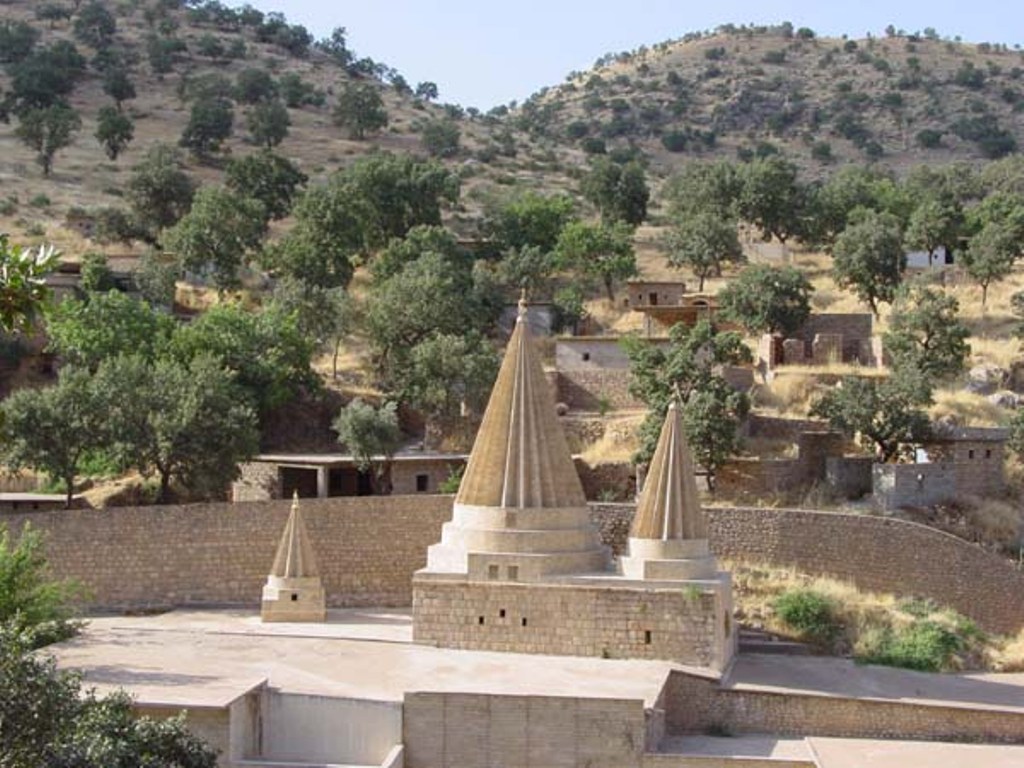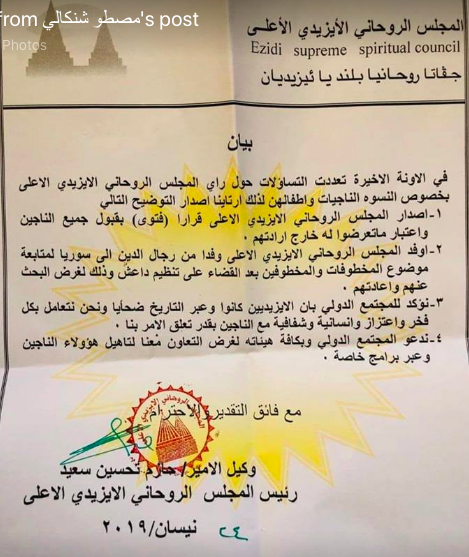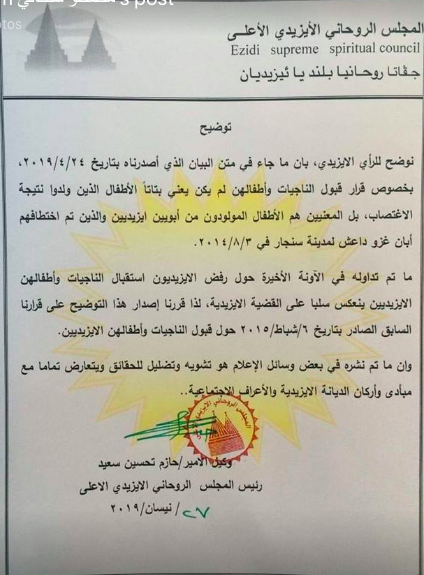By Khalid Fatah
The US-backed Syrian Democratic Forces (SDF) announced on March 23, 2019 that they had eliminated the Islamic State group’s (ISIS) last Syrian territory after capturing ISIS’s stronghold of Baghuz in the country’s eastern desert. Fifteen months prior, the Iraqi government made a similar announcement, declaring victory over ISIS and the liberation all of Iraqi territories from the extremist organization, which swept across large swathes of the country’s west and north, even threatening the capital Baghdad itself, in the summer of 2014.
However, the territorial defeat of ISIS militants in both countries does not mean that ISIS no longer poses a threat to Syrian and Iraqi populations. Some fighters managed to flee into remote desert areas straddling the Syria-Iraq border, where they are reconstituting themselves into an underground insurgency. Thousands of foreign militants are held in detention by the SDF—their home countries refuse to take them back, meaning that families of these fighters remain locked in camps. Moreover, the destructive influence ISIS exerted on minority communities lingers, particularly on Christians and Yazidis, who were exposed to a dreadful massacre campaign in the city of Sinjar and surrounding areas.
The Yazidis (Izidi in Kurdish) are ethnic Kurds who speak Kormanji, a dialect of the Kurdish language, and follow an ancient religion based on holy texts passed down for thousands of years in the area known as Mesopotamia. The Yazidis are scattered in several countries of the Middle East and Central Asia including Turkey, Syria, Armenia, Georgia, and Iraq. In Iraq, most are distributed in the Sinjar district (Shangal in Kurdish), located west of the Iraqi city of Mosul, as well as the Shiekhan area, east of Mosul, where the holy Lalish temple resides.

Lalish Temple. Source: Wikimedia Commons
The Yazidis count 72 massacres that they suffered under the Ottoman empire. These campaigns are known to the Yazidis as Farman, which translates to “decision,” referencing the killing orders issued by the high authorities of the Ottoman Empire. The 73rd and last massacre was carried out by ISIS in August of 2014.
Assault on Sinjar
On August 3rd, 2014, ISIS attacked Sinjar city and the surrounding areas along the Syrian border, where they killed Yazidi men and kidnapped women and children as spoils of war. According to the organization’s extremist ideology, Yazidis are infidels. The secrecy surrounding Yazidi religious rites has led ISIS, as well as many others, to incorrectly assume the Yazidis worship the sun, or the devil, or that their religion is intimately connected to Zoroastrianism.
During the first few days of the offensive, ISIS killed more than 1,200 Yazidi civilians. The slaughter continued during the months and years that followed. Since these killings, 71 mass graves have been found, according to the latest report published by the director of Yazidi affairs of the Kurdistan Regional Government (KRG), and the search for more mass graves continues.

Yazidi refugees who fled Iraq for neighboring Syria. Source: DFID
In September 2015, the Kurdistan Peshmerga Forces, supported by the US-led International Coalition, liberated the Sinjar district from the terrorist group—an operation that left behind enormous destruction. Four years later, the fate of many kidnapped women and girls remains unknown. Many of the kidnapped women returned to their families after suffering abuse, torture, human trafficking, and rape, which left behind deep physical and psychological scars. But some of them had children from the ISIS fighters. In this case, they had two difficult options—either give up their child to an orphanage run by the Kurdistan Regional Government, or stay in the Kurdish controlled-area in northern Syria and keep their babies.
The story of one 17 year old girl
A 17 year old Yazidi girl spoke anonymously, under the initials H.M., to a Navanti researcher. She recalled her painful journey that began when ISIS attacked her city of Sinjar in the summer of 2014, where she was kidnapped along with other Yazidi women and children:
“I was the only one in my family who could not escape. I was caught with a number of women and held in a large building in Telafar city. The place was crowded, the children were crying out of fear, and no one realized how much our lives had changed in just a few days. The ISIS leader, or those who looked like high ranking members, came every day to take a couple women with them.”
“Some of the ISIS fighters spoke an Iraqi dialect, and others were speaking a different dialect of Arabic or a speaking a language that we did not understand. Weeks went by before they sent me with couple other girls to Mosul city, which was the second stop in my very painful two and a half year journey. I faced all types of torture and abuse. I have been given to multiple men many times, when they were got bored they would give me to someone else as a gift. I would be raped by men then sold again.”
“In the last 14 months, an ISIS fighter from Mosul bought me, and he was much better than any other one I encountered. He was already married but he married me, which turned his wife and his family against me. They treated me very poorly, especially after I became pregnant and had a girl that I named H.B. I tried to escape several times but it was difficult to survive…I had no choice but to stay with him, believing that he was better than the others that I met.”
“In the last few days of the liberation of Mosul, I knew he had been wounded. I never heard from him again and then the Iraqi Mobilization Forces (IMF) freed us [my daughter and me]. During this period, I had not received any information as to what happened to my family until I found them in a camp in Zakho city. My story and the pain I had endured did not end when I met my family and community. Their looks hurt me, even the innocent ones. My abduction, and having a child from an ISIS man, was disgraceful to my family.”
“They were taking all liberated women to the Lalish Yazidi temple, which is the holiest temple for Yazidis located in the Shiekhan area [in Dohuk province], where Baba Sheikh [the top Yazidi religious authority]…baptized the survivors. He baptized me but refused to do so for my daughter. At that moment, I realized I had to choose between two difficult options, either to give up my daughter or to live with her in a special care house run by the KRG away from my family. In the end, I had to give her up. I learned later on that she is with a good family from Erbil city.”
“Since they adopted her, I feel like they took my soul from my body.”
Legal and Religious Laws Prevent Reintegration and Healing
The legal and religious cases of the Yazidi women who had children with ISIS fighters were very complex and challenging. In the Yazidi faith, a newborn must have Yazidi parents in order to be integrated into the community. But despite the Iraqi constitution guaranteeing freedom of religion, the Iraq Personal Statute states that all babies born of an unknown father are registered as Muslims along with their mother, even if they don’t identify as one. This law applies to all Christians, Sabean Mandaes, Yazidis, and others.
An expert in Yazidi Affairs, journalist Khider Domili, told Navanti from Dohuk province, “This problem is not just related to the Yazidis, but all the people from ISIS controlled areas are facing the same issue. There are about 2,000 such children in Mosul, around 1,000 in the city of Ramadi, and similar numbers in Hawijeh and Fallouja. All of them have unknown fathers who were ISIS fighters..the Iraqi government evades this subject because according to the current Iraqi laws it cannot be addressed.”

Yazidi children in Iraqi Kurdistan. Source: Defend International
Article 2 of the Iraqi constitution states that, “This constitution guarantees the preservation of the Islamic identity of a majority of the Iraqi people and guarantees the full religious rights of all individuals to free beliefs and religious practices such as Christians, Sabean Madaae, and Yazidis.” This is in opposition to Article 26 of the National Card Act issued in 2016, a part of the Iraq Personal Statute referenced above, which states that “children who are minors follow the religion of Islam if one or both parents convert to Islam.”
For Yazidis, these legal precedents have had profound social effects. The minor children born to unknown fathers with ties to ISIS are legally considered Muslims, but this cannot be accepted in a closed conservative society such as the Yazidi community. Mr. Domili says, “if a Yazidi woman already had two children and then gave birth to two other children from ISIS fighters, the entire family will be considered Muslim because they are minors with an unknown blood line.”
He added that “what ISIS did to them by force, this [National Card] Act does the same thing by law.”
Solutions Remain Elusive
In a historical initiative to solve the problem of the ISIS survivors and their children, the Yazidi Supreme Spiritual Council issued a statement on April 24, 2019 in which they welcomed all survivors of ISIS. This statement was not sufficiently clear, as it did not address children born of ISIS fighters, and caused division in the Yazidi community. Some rejected the decision while others considered it a solution, even if it was incomplete.
The pressure exerted by opponents of this statement may have been the reason behind the release of a second statement by the Yazidi Spiritual Council on April 27, 2019, which read, “the acceptance of the [ISIS] survivors does not mean the acceptance of those born as result of rape whatsoever.”


The best possible solution, which might satisfy both legal and social concerns, requires an amendment or changes introduced by the Iraq parliament and addressing current laws, in order to allow the children born as result of rape to choose their parentage. In this case, a mother could register her child under her name and based on her religious beliefs. Alternatively, if she does not want to keep her child, she could give him or her to a government-run orphanage.
Even if these changes were implemented, they would not solve all the Yazidi’s myriad problems, especially in Sinjar. Legal changes would not make it easier for Yazidis to return to their homeland, whose infrastructure and social fabric was gutted by war. They would not guarantee acceptance of ISIS children within the Yazidi’s conservative society. In addition, most Yazidis agree that returning to their homes, and the future protection of all religious minorities in Iraq, requires an international effort, and accountability for ISIS members and everyone who supported them from the Sunni tribes in western Iraq. Finally, true healing would require a social reconciliation among all sides, which seems farfetched given Iraq’s current political and economic crises.
Khalid Fatah is a Navanti analyst and reporter with the Voice of America’s Kurdish Service.

